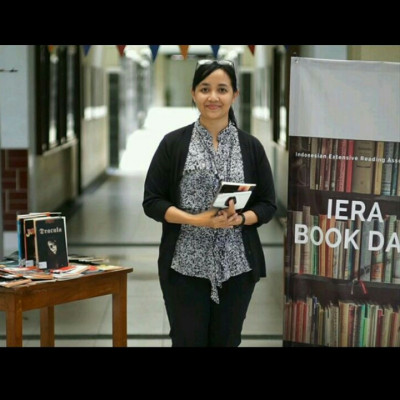Sessions / Will be recorded
English Learning Achievement in Extensive Reading Class through Digital Literacy Practices #1571
This article aims to describe how learners can develop and implement digital literacy practices to improve their English learning in Extensive Reading class. Three factors that contribute to digital technology's advantages are more comfortable access to reading resources, various reading resources are available, and reading resources are updated.
Testing Extensive Reading #1638
Should we assess Extensive Reading? What do we mean by assessment? How should we do it?
APERC: Annual Paper-based Extensive Reading Club In China #1547
In China, test prep programs such as TOEFL and SAT, SSAT are an eternal topic for those students who study English. However, how to balance the intensive and extensive reading and how to assist test prep by guided academic extensive reading are questions need to be answered in reality.
Reflection on the Practice of Extensive Reading in China #1546
We are an English training institution that has practiced extensive reading for two years. We have achieved lots of extensive reading results and found some problems with extensive reading. In the process, we have combined extensive reading and intensive reading to help more children benefit from reading.
A Machine Learning Method for Estimating the Difficulty Level of Graded Readers #1587
A machine learning method was investigated to analyze how syntax affects reading difficulty, first categorising graded reader texts into parts of speech, then using a sliding window method to count different patterns of word types. Next we used clustering to check whether the features could be classified by difficulty level.
Mini-Bibliobattle and Extensive Reading: A Case Study of a Japanese University #1586
This study will report a case study of an 8-week-ER class where a maximum of 60 university students will participate in Mini-Bibliobattle. Mini-Bibliobattle refers to a book review battle, where students present their favored book for 3 minutes in their L2 and the listeners decide the best one.
Motivating Chinese Higher Vocational College Students in English Reading #1598
In an ongoing English reading course at a Chinese higher vocational college, a variety of extensive reading programs have been carried out. Students’ homework, feedback and the results from course questionnaire indicate that some are motivated to read and many find the course interesting and inspiring.
Comic Readers in the EFL Classroom? Yes, of course! #1703
Are you looking for fun and easy reading materials for your students? Have you ever thought about using comic readers with your students? e-future's Graded Comic Readers are fun and engaging stories designed to help EFL students improve their overall English language abilities. Your students will have fun and gain confidence as they learn new vocabulary and grammar, while improving their reading, speaking, and listening skills. Comic Readers not only help students become successful language learners, but also allow student to develop a positive association with reading. This session will 1) introduce e-future's Graded Comic Readers, 2) explain the benefits of using comic readers and 3) provide activity ideas for comic readers.
Learner Audio Use in a Large Extensive Reading Program #1599
Learners in a large extensive reading program at a Japanese university using Xreading had access to audio recordings for each book. Presenters will report on why some learners chose to listen and will characterize the methods learners used to do so. Data from surveys and interviews will also be shared.
How Does Extensive Reading Help Japanese EFL Learners’ Summary Writing Ability? #1597
The aim of the study is to examine how extensive reading would help Japanese EFL learners to develop summary writing ability. The results indicated that the ER group developed their ability to provide more detailed description of a story with a clearer sequence of events than their counterparts.
A Task Based Approach to Creating Effective Reading Circle Activities #1544
This presentation will give the results of the instructor’s experience designing tasks for Reading Circles built on multiple copies of the same set of Graded Readers in a modified ER-based program. The presentation will explore a number of activities including reports that target vocabulary acquisition and integrate online digital tools
Transitioning a University Extensive Reading Program from Print to Digital Books: M-Reader to Xreading #1575
This paper reports on the transition from physical to digital books in a university-wide extensive reading program in Japan. Not only will students’ learning outcomes and responses to their online reading experiences be shared, but comparisons of the two learning environments will also be offered: paper-based reading and screen-based reading.
Six Content Elements that Motivate Learners to Read #1709
To motivate learners, reading content must instill genuine interest. We need to feel a connection to the material which makes us want to find out more. This paves the way for a lifelong, sustainable - and enjoyable - reading habit. In this session, featuring examples from National Geographic Learning graded readers, we will discover six elements that inspire English learners to go beyond a superficial glance at a passage to explore and analyze the text.
How to Start an ER Program without Graded Readers #1692
In this presentation we will explore other resources which are available online and which can be downloaded and printed out for your students. These resources can be used in class or even taken home since ER does not need to be done in the classroom. Students can read in their own time at their own pace. Participants will be provided with information on many resources that are available – well over 2000 texts!
ER and Reading Targets - An Investigation into the Rationale behind Teachers’ Choices #1581
Deciding reading targets is often an important aspect of planning an ER program. However, little is known regarding teachers’ rationale behind those choices. In this presentation, the authors will attempt to shed light on those reasons based on the results of a qualitative study.
Atheists, agnostics and true believers: what instructors in a university extensive reading programme believe about about extensive reading #1686
In this presentation I discuss what instructors involved in an extenisve reading programme believe about extensive reading. While much of the literature on extensive reading argues for the benefits of extensive reading (for example improved reading fluency, vocabulary acquisition and increased cultural knowledge), what instructors believe about the value of extensive reading may differ in several ways from this. Utilizing data taken from a focus group with six instructors who teach in a Freshman English course at a private university in central Taiwan that includes extensive reading as a programme component, findings reveal that teachers bring to bear a wide variety of beliefs regarding extensive reading; these include what I term 'atheism' (a lack of belief in the approach), 'agnosticism' (doubts about the efficacy of extensive reading) and 'true belief' (an acceptance that extensive reading is of benefit to L2 acquisition). Analysis of the data shows that such teacher beliefs are informed by previous experiences as an L2 reader, prior experience teaching reading and beliefs about the reading habits of students. This presentation makes the case that extensive reading programmes should allow instructors to adopt a variety of approaches to implementing extensive reading that are in keeping with individual teacher beliefs.
Setting up ER Program to Empower Community: A Story from IERA #1566
The presentation aims at sharing best practices and showing opportunities of setting up ER programs in challenging circumstances like in Indonesia. It is hoped that what IERA has done could inspire other communities that plan to set up ER programs in their respective places.
Assessments in an ER Program: Contradicting the ER Approach? #1583
This presentation will share how alternative assessments can be used as a measurement tool in an ER program without contradicting the nature of ER approach. Some examples will be shared to illustrate the points. It is expected that this session can contribute ideas particularly on assessments in an ER program.
The Ideal MReader Set-Up for Your Kind of School #1570
MReader is free software, offered by the Extensive Reading Foundation that allows students and teachers to track their reading of over 8000 published readers in a gamified and motivating fashion. We will discuss how to tailor MReader for your specific educational context.
Tying Fluency Reading to Regular Course Content #1594
Various activities can be conducted in class to maximize fluency building opportunities with graded readers and regular course target language. Speaking and writing activities based on thematically connected graded readers, and reading aloud activities constructed from target language can promote both wide and narrow fluency development.
How Do I Get My Students to LOVE Reading? #1654
Explore the importance of the classroom library and its relationship to reading achievement. Identify the guidelines for a quality classroom library. Discover how to use the classroom library effectively to increase independent reading
Graded Readers as Intralingual Literary Translations #1562
In this short presentation, I will approach graded readers from the perspective of Translation Studies, where they constitute a marginal phenomenon. I will discuss their research potential within the areas of intralingual and literary translation, and I will seek to start a discussion.
The Impact of Online Extracurricular Extensive Reading Activities on Indonesian University Students’ Reading Habits and Attitudes #1584
Through a RELO U.S. Embassy Jakarta program, Rachel S. Wang conducted extracurricular synchronous online extensive reading activities with Indonesian university students. She read books aloud, designed creative tasks, and had students create their own picture books. Survey data shows students’ reading habits and attitudes improved after completing these online activities.
Xreading: What’s New and What’s Next #1605
Xreading is an online library that gives students access to thousands of graded readers and allows instructors to track their students’ reading progress. In this presentation, the founder of Xreading will explain the new features and improvements, and review what is planned for the future.
Improving the combination of Intensive and Extensive Approach by Extensive Readers Club project #1576
this presentation will share the finding of pilot project implementation of extensive reading clubs. steps of the project, methodology of measurement on 300 selected readers in 17 different provinces and districts. final report of the project implementation raised extensive readers voice to decision makers to expand English class inputs and combination of IR and ER.
Harvest Growth, Seeding the Future #1687
Report on the activities of PERC.
Reading for Beginners #1554
How to acquaint Educators and Parents on teaching beginners how to read in a fun and easier way.
Write your own original Graded Reader story! #1768
Do you have an original story to tell? Could it work as a Graded Reader for teenage learners of English? Join this session with a Commissioning Editor from Oxford University Press to see if your idea is interesting enough to take forward.
Leading into Extensive Reading through Storytelling #1593
The presentation aims to recount how reluctant readers in a UAE higher education institution were lead into extensive reading (ER) through an online storytelling activity where students read graded readers aloud whilst recording themselves in a Zoom meeting. This was then shared on a Microsoft Stream channel for viewing outside the classroom. The project was devised to foster language and social entrepreneurial skills as well as motivating students to read extensively.







































